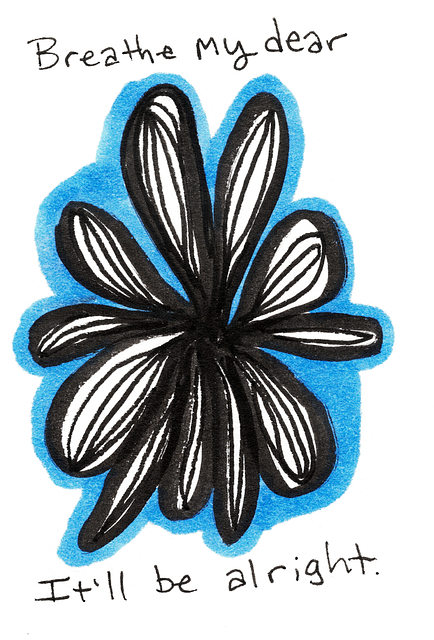Short-term Cognitive Behavioral Therapy (CBT) offers rapid relief for specific mental health issues through structured, 45-60 minute sessions that focus on thought pattern modification. This goal-oriented approach empowers individuals with practical coping strategies for immediate and long-term mental well-being management. CBT has proven effective for anxiety, depression, PTSD, eating disorders, and substance abuse, integrating cognitive restructuring, behavioral activation, and exposure therapy to enhance self-awareness and improve emotional health. Overcoming misconceptions and embracing active participation are key to unlocking CBT's transformative benefits in daily life.
“Uncover the transformative power of Short-Term Cognitive Behavioral Therapy (CBT), a highly effective approach to mental well-being. This article provides a comprehensive guide, exploring the core principles and techniques that form the backbone of CBT. From understanding its brief yet impactful nature to discovering its proven effectiveness in managing diverse disorders, we delve into the therapeutic process, challenges, and strategies for integration. Embrace the tools and insights to harness the power of CBT for lasting positive change.”
Understanding Short-Term CBT Therapy: A Brief Overview

Short-term CBT therapy, as the name suggests, is a focused and intensive approach to mental health treatment, designed to deliver rapid and effective results. This form of therapy differs from traditional cognitive behavioral therapy, which may extend over several months or even years. In short-term CBT, therapists work collaboratively with clients to identify specific problems and develop tailored strategies within a condensed time frame. The primary goal is to empower individuals with practical tools to manage their mental health challenges immediately and in the long term.
This therapeutic method is particularly effective for those seeking immediate relief from specific issues like anxiety disorders, depression, or certain phobias. By concentrating on targeted problems, CBT therapy helps clients gain insights into their thoughts, feelings, and behaviors, enabling them to make sustainable changes quickly. Through structured sessions, therapists guide clients in challenging negative thought patterns, modifying maladaptive behaviors, and adopting healthier coping strategies.
Core Principles and Techniques of CBT

Cognitive Behavioral Therapy (CBT) is a structured and goal-oriented approach that focuses on identifying and changing negative thought patterns and behaviors. Its core principles revolve around understanding the connection between thoughts, feelings, and actions, emphasizing how our cognitive processes significantly influence emotional well-being. The therapy aims to help individuals challenge and replace maladaptive thinking with more realistic and balanced perspectives.
Key techniques employed in CBT include cognitive restructuring, where therapists assist clients in recognizing and modifying distorted beliefs; behavioral activation, encouraging participation in activities that promote positive emotions; and exposure therapy, gradually facing fears to reduce anxiety. Through these methods, CBT enables individuals to develop coping strategies, enhance self-awareness, and improve their overall mental health.
Benefits and Effectiveness in Various Disorders

Short-term cognitive behavioral therapy (CBT) has been recognized as an effective treatment approach for a wide range of mental health disorders. Its core principle involves helping individuals identify and modify unhelpful thought patterns and behaviors, ultimately improving emotional well-being. CBT focuses on the present and future, empowering clients to develop practical coping strategies that can be immediately applied to daily life.
The effectiveness of CBT has been extensively studied, with research highlighting its benefits in treating conditions such as depression, anxiety disorders, post-traumatic stress disorder (PTSD), eating disorders, and substance abuse. This therapy type is particularly beneficial for those seeking a structured yet flexible treatment framework. By targeting specific symptoms and teaching new skills, CBT enables individuals to gain a deeper understanding of their thoughts and behaviors, fostering long-lasting positive changes.
The Therapeutic Process: Sessions and Activities

The therapeutic process of short-term cognitive behavioral therapy (CBT) involves a series of structured sessions designed to help individuals identify and change unhelpful thought patterns and behaviors. Each session typically lasts 45-60 minutes and is conducted in a safe, supportive environment. The therapist guides the client through a systematic approach, encouraging active participation and self-reflection. During these sessions, clients learn coping strategies, challenge negative thoughts, and acquire new skills to manage their emotions effectively.
Activities may include homework assignments where clients are tasked with applying learned techniques between sessions, cognitive restructuring exercises to reframe negative thoughts, and behavioral experiments to test the validity of beliefs. Through this interactive process, CBT fosters self-awareness, empowers individuals to take control of their mental health, and promotes positive changes in thinking and behaving.
Common Challenges and How to Overcome Them

Many individuals facing mental health issues hesitate to embrace short-term cognitive behavioral therapy (CBT) due to misconceptions and challenges. Common hurdles include fear of vulnerability, concerns about time commitment, and doubt in its effectiveness. Overcoming these obstacles is crucial for reaping CBT’s benefits. Encouraging open communication with therapists builds trust, assuring clients that CBT involves structured yet flexible sessions tailored to their unique needs. Emphasizing the focus on actionable solutions rather than deep personal exploration can alleviate fears of vulnerability. Additionally, scheduling regular check-ins and celebrating small victories along the journey helps maintain motivation and commitment. Recognizing that CBT is a powerful tool for managing symptoms within a defined timeframe can dispel doubts, allowing individuals to embrace this transformative process.
Integrating CBT into Daily Life and Long-Term Management

Integrating CBT into daily life is a key aspect of its success and longevity. Unlike traditional talk therapy, CBT focuses on practical techniques that individuals can apply to manage their thoughts and emotions effectively. This includes cognitive restructuring, where clients learn to challenge negative thought patterns and replace them with more realistic and balanced perspectives. Additionally, behavioral activation encourages individuals to engage in activities that promote well-being, enhancing overall mental resilience.
For long-term management, CBT offers ongoing support by equipping individuals with coping strategies that can be adapted to various life circumstances. By regular practice, these techniques become integral parts of one’s daily routine, fostering better emotional regulation and mental health. This proactive approach allows for the prevention of relapses and promotes a sense of autonomy in maintaining a positive mindset.
